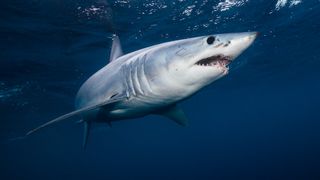Threatened shark meat is being served as fish and chips in Australia
Fish and chip shops across Australia are using threatened shark meat in their food.

The meat from several threatened shark species is being served as fish and chips at restaurants across southern Australia and could become a public health hazard, a new study finds.
Researchers from the University of Adelaide analyzed DNA samples from meat served at 100 fish and chip shops scattered across the region and found that 23% of the samples contained shark meat filets (often referred to as flake) from shark species listed as threatened by The International Union for Conservation of Nature Red List of Threatened Species, the entity that tracks population numbers on a global scale. Those shark species include the shortfin mako shark (Isurus oxyrinchus) and the smooth hammerhead shark (Sphyrna zygaena), according to the study, which will be published in the June 2023 issue of the journal Food Control.
"We know that seafood fraud is omnipresent and a large issue," Ashleigh Sharrad, the study's lead author and a research assistant in the School of Biological Sciences at the University of Adelaide, told Live Science in an email, "but I was always wondering what shark[s] are we actually eating?"
Of the meat samples analyzed, only 27% contained meat deemed legal for Australian fisheries to label as flake by the Australian Fish Names Standard, a resource that provides information on the more than 5,000 fish species inhabiting Australian waters. Those included flake from the gummy shark (Mustelus antarcticus) and the New Zealand rig (Mustelus lenticulatus), both of which are considered sustainable, according to a statement.
In total, researchers identified nine different shark species, according to the study.
Related: Sharks do actually sleep, and sometimes with their eyes open
Researchers also discovered that of the samples, "only one in ten retailers could correctly identify the type of fish being sold, while 20% of the filets were mislabeled and the remainder had ambiguous labeling," according to the statement.
Sign up for the Live Science daily newsletter now
Get the world’s most fascinating discoveries delivered straight to your inbox.
Here's why that's a potential health issue: In many cases, shark meat can contain high levels of mercury and other toxins. "In sharks, there is evidence of larger individuals and species that are higher up [on] the food chain having accumulated levels of heavy metals and other toxins," Sharrad said. "Some research has found shark meat with toxic levels for human consumption, so when there [are] umbrella terms such as' flake,' consumers are unable to know if they are eating species that are potentially harmful to their health."
She added, "Although endangered shark species have been found globally to be served to consumers, it was a surprise to find out that Australians are unknowingly eating iconic species, such as endangered hammerhead."
Sharrad and her team are hopeful that their research will be the first step in creating stricter guidelines within the fishing industry.
"Change needs to occur on many levels," Sharrad said. "We can't place blame on any stage of the process as mislabeling (intentionally or not) could have occurred at multiple stages. However, there is a clear misguidance at the fishing level — where endangered species are legally caught and sold. This research will hopefully aid the efforts to strengthen our seafood labeling laws to align with more stringent regulations."

Jennifer Nalewicki is a Salt Lake City-based journalist whose work has been featured in The New York Times, Smithsonian Magazine, Scientific American, Popular Mechanics and more. She covers several science topics from planet Earth to paleontology and archaeology to health and culture. Prior to freelancing, Jennifer held an Editor role at Time Inc. Jennifer has a bachelor's degree in Journalism from The University of Texas at Austin.
